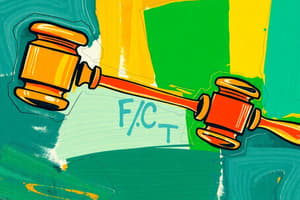Podcast
Questions and Answers
What is a requirement under the Truth-in-Lending Act?
What is a requirement under the Truth-in-Lending Act?
- Creditors must notify borrowers of the maximum loan amount.
- Creditors are prohibited from charging any origination fees.
- Creditors must disclose the minimum payment amounts on credit cards.
- Creditors must provide information about APRs and transaction fees. (correct)
What does the Fair Credit Reporting Act primarily regulate?
What does the Fair Credit Reporting Act primarily regulate?
- The fees associated with consumer credit cards.
- The accuracy of information in credit reports. (correct)
- The collection methods of debt collectors.
- The maximum interest rates that can be charged.
Which act prohibits discrimination in credit lending based on certain personal characteristics?
Which act prohibits discrimination in credit lending based on certain personal characteristics?
- Fair Debt Collection Practices Act
- Consumer Credit Card Act
- Equal Credit Opportunity Act (correct)
- Truth-in-Lending Act
Which of the following is a provision of the Fair Debt Collection Practices Act?
Which of the following is a provision of the Fair Debt Collection Practices Act?
What does the Consumer Credit Card Act directly limit?
What does the Consumer Credit Card Act directly limit?
What is the purpose of the Consumer Lending Act?
What is the purpose of the Consumer Lending Act?
Under which chapter of the Bankruptcy Code do most filings request debt discharge due to inability to repay?
Under which chapter of the Bankruptcy Code do most filings request debt discharge due to inability to repay?
What is the result if a creditor violates the Fair Debt Collection Practices Act?
What is the result if a creditor violates the Fair Debt Collection Practices Act?
Flashcards
Truth-in-Lending Act (TILA)
Truth-in-Lending Act (TILA)
Federal law requiring creditors to disclose information about loans, like APRs and fees.
Consumer Lending Act
Consumer Lending Act
Federal law covering personal loans that are leases for over four months; limited to $50,000.
Consumer Credit Card Act
Consumer Credit Card Act
Law that amends TILA, putting limits on interest rate increases and fees on credit cards.
Fair Credit Reporting Act (FCRA)
Fair Credit Reporting Act (FCRA)
Signup and view all the flashcards
Equal Credit Opportunity Act (ECOA)
Equal Credit Opportunity Act (ECOA)
Signup and view all the flashcards
Fair Debt Collection Practices Act (FDCPA)
Fair Debt Collection Practices Act (FDCPA)
Signup and view all the flashcards
Chapter 7 Bankruptcy
Chapter 7 Bankruptcy
Signup and view all the flashcards
Bankruptcy Code
Bankruptcy Code
Signup and view all the flashcards
Study Notes
Consumer Issues
- Consumer credit protection laws are enforced by the Federal Trade Commission and the Bureau of Consumer Protection.
- Key Acts include:
- Truth-in-Lending Act (TILA)
- Consumer Lending Act
- Consumer Credit Card Act
- Fair Credit Reporting Act (FCRA)
- Equal Credit Opportunity Act (ECOA)
- Fair Debt Collection Practices Act (FDCPA)
Truth in Lending Act (TILA)
- TILA is codified under 15 U.S.C. §§ 1601-1667f.
- Creditors must provide certain written disclosures concerning financial responsibilities, APRs, transaction fees, etc.
- Penalties for violations can be both civil and criminal.
Consumer Lending Act
- Applies to personal leases lasting more than four months.
- The lease obligation value cannot exceed $50,000.
Consumer Credit Card Act
- Amended TILA regarding interest rate increases and restrictions on fees (including late fees), notably requiring notice of such increases and specifying when bills must be delivered.
Fair Credit Reporting Act (FCRA)
- Regulates credit bureaus, ensuring accuracy in credit reports.
- Amended by the Fair & Accurate Credit Transaction Act, enabling free annual credit reports.
Equal Credit Opportunity Act (ECOA)
- Prohibits credit discrimination based on race, sex, color, religion, national origin, marital status, poverty, age, etc.
Fair Debt Collection Practices Act (FDCPA)
- Fosters fair and transparent notice during debt collection.
- Permits debtors to dispute debt validity within 30 days.
- Grants consumers legal recourse against collectors violating the act and causing damages.
Bankruptcy
- Bankruptcy is governed by U.S.C. Title 11 (enacted in 1978).
- The U.S. Constitution grants Congress the authority to create uniform laws on bankruptcy.
- Three main types of Bankruptcy:
Chapter 7 Bankruptcy
- Often voluntary, applied for by individuals or businesses because they cannot repay their debts.
- Certain assets might be liquidated to repay creditors proportionally.
- Creditors may not fully recover their debts.
Chapter 13 Bankruptcy
- Available exclusively for individuals and sole proprietorships (not other business types).
- Enables a court-protected repayment plan over several years.
Chapter 11 Bankruptcy
- Available to operating businesses, preventing debt discharge.
- Businesses develop and propose a repayment plan to creditors, aiming for restructuring rather than total debt discharge.
Studying That Suits You
Use AI to generate personalized quizzes and flashcards to suit your learning preferences.
Related Documents
Description
This quiz explores various consumer protection laws related to credit, including key acts such as the Truth-in-Lending Act and the Consumer Credit Card Act. Understanding these laws is essential for protecting consumer rights and ensuring fair credit practices. Test your knowledge on the responsibilities and penalties associated with these acts.




